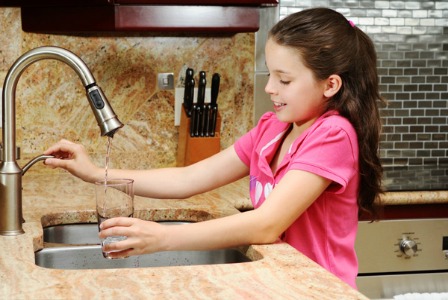
You grew up drinking from the hose and turned out just fine, but today's water options may have you wondering: Is your water poisoning your child? From tap water to bottled brands, discover the differences in the types of water out there.
Hidden dangers in drinking water
Find out what pediatricians say is the healthiest source for hydrating your kids.
Worries about toxic water
Since the famous Hinkley toxic water litigation of Erin Brockovich fame, parents across the country were suddenly over-analyzing the drinking water their families drank. Attention has even been turned to the effects of pharmaceuticals that have been flushed and end up in our water table — and the water that ends up at our tables. But, with worries of impurities such as arsenic and chlorine in the water we drink, when it comes to your kids and drinking water, is tap water, bottled water, filtered water or other thirst-quenching source best?
Discover everything you need to know about kids and dehydration>>
Types of drinking water
Before you can figure out which type of drinking water is best for your kids, you'll have to clear the confusion about what you're putting to your kids' lips:
Tap water -The Environmental Protection Agency oversees municipal water quality, requiring the thirst-quenching source to be treated according to standards that limit contamination levels that make it safe for human consumption.
Bottled water - Bottled water isn't a one-size-fits-all source of water, but in general, the water is filtered and then infused with minerals such as salt and sometimes even fluoride. It's the job of the Food and Drug Administration to monitor bottled water quality, but in comparison to the EPA, it has less strict standards.
Filtered water - All tap and bottled waters are filtered by some method, but other point-of-use filters, such as Brita filters, use physical barrier methods to remove the taste and odor of minerals such as chlorine, copper and mercury, as well as some pharmaceuticals like Acetaminophen sometimes found in tap water.
Purified water - Purified water is any drinking water that has been filtered or processed to clean for consumption, including distillation, reverse osmosis, carbon filtration, electrodialysis and more.
Fluoridated water - Both tap and bottled water may include fluoride in its list of additives to aid in the prevention of cavities. "Children and adults alike should have a certain daily amount of fluoride in their diet, so if the water is fluoridated then this is better," advises Thomas M. Seman, MD, North Shore Pediatrics.
Distilled water - Distilled water is H2O that has been through the distillation process, which involves boiling the water and condensing the steam into a clean container, which removes many impurities, including minerals and salt.
Uncover the top 6 myths about bottled water>>
Best source of drinking water
In the battle between bottled versus filtered versus tap water, the answer may be simpler than you think when it comes to kids and drinking water.
"The best type of water to use to hydrate your child is clean water," shares Dr. Seman. "If your tap water quality is safe then this is fine. Bottled, filtered, Brita — all of these are filtered water to provide a safe water to drink." But, when in doubt of the quality of the water your kids are drinking, bring the drinking water to a boil to destroy any bacteria that may be lurking within and wash your worry away!
Whether you reach for tap water, filtered water, purified water or other source of H2O, it's important to read labels and do your research when choosing the cleanest source of drinking water for your kids. Many bottled water sources, such as Aquafina and Dasani are simply filtered from the same source as tap water — municipal water sources — so do a little legwork before shelling out the extra cash just because you think your water may be poisoning your child.
More about kids and drinking water
Kids, drink up!
Is bottled water contributing to your child's cavities?
Fluoride and drinking water: An ongoing controversy